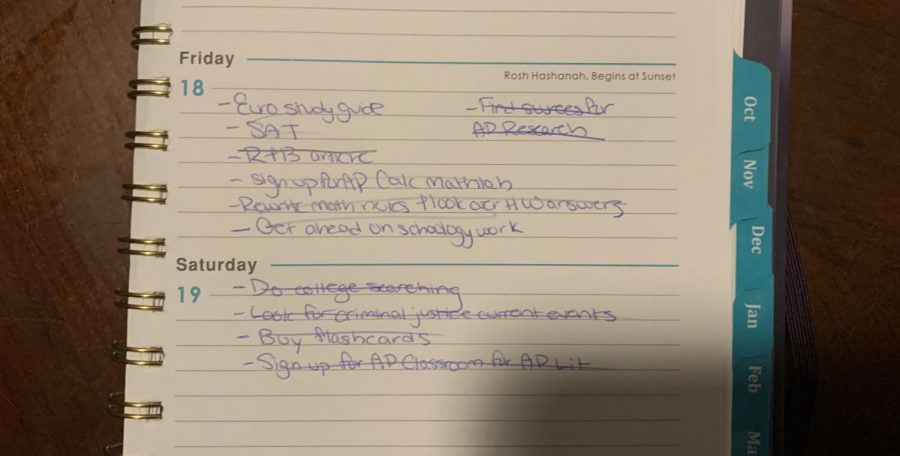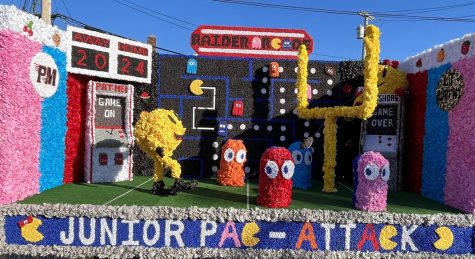How to Survive High School (Part 3)
Tips on Time Management, Focus Strategies, Studying Help & More!
Photo by Yetunde Olagbegi
“This is my planner for the 20-21 school year. As you can see I cross out assignments as I finish them to not only better organize my time, but to motivate myself with my progress.
School has just begun, and with that comes an overload of assignments that need to be done, projects that need completing, and so on and so forth. All of that work can be grueling, and sometimes it may feel like it is too much or there is not enough time in the day to get it done.
Everybody is different, and has strategies that help them, while others have an entire, intricate way of completing their assignments. Some things may work for you, and others may not. That is okay as long as you find a balance that helps you be the most productive and achieve the goals that you have set for yourself. I contacted my friends, most of them being seniors, and asked them what has helped them survive high school work thus far.
I also asked family and friends I have outside of Pat-Med to see what helps them. My friends and I have similar tools that work for us, and I also included tips that work for me that they didn’t say. Without further ado, here are a list of tips that will (hopefully) help you get the most work done in the smallest amount of time, and help you thrive in high school:
Reward yourself when you complete assignments:
This can serve as another form of motivation to encourage you to get work done. This can come in many forms. A reward may be a ten-minute break after an hour of studying, which I mentioned before, is the optimum way of studying. You can also take it a step further. Maybe you can promise yourself a treat, like some fro-yo, if you finish the lengthy project you really do not want to do. This will push you to get the work done so you can get a well-deserved treat at the end. Rewarding yourself after you complete assignments will not only encourage you to do your best work, but allow you to be compensated for it as well.
“I used to teach kids (before the pandemic) and what I learned is that if you give them a reward when they do something good they will relate it with a positive feeling and want to do that action more. I transferred this into my time management so instead of thinking about the five hours of homework I have I think about how when I am done I could watch an episode of a show or practice piano. I’ve learned that over time you will start to correlate a positive mentality without a reward and learn to manage your time for the benefit of your own good. I had one student that we gave candy to every time they did an action well and overtime they wanted candy for doing a more challenging action instead, which is a perfect example of how small rewards can encourage you to strive for more. To sum up, I personally think that positive encouragement and rewards can help you stay on task, manage your time the best , and keep your focused on your work!” ~Lianna Pottgen, 12th grade
Form a study group:
Get a couple of friends together from each class you have and form a group. This can help in various ways. Having a couple of set friends that you know in each class can help you out when you for example, forget what the homework is or lose a page of notes in your backpack. If you do not know anyone in your class, try and make some. Coming from a very introverted person I know it can be hard but knowing at least one person in a class can help you out a ton, especially if you are absent one day. This can also be applied to study groups.
Studying in a group setting allows you and the others in the group to bounce ideas off of one another, share tips and tricks like mnemonics, and increase your knowledge of the subject matter collectively. Having others back you up is supposed to decrease the amount of distractions that may arise if you were studying by yourself, not increase them! If you are thinking about studying with friends but you know all you will do is chat and get distracted rather than study, I would abstain from study groups altogether.
Eat before you do work:
This works for some people, but especially for me. I know some people like having study snacks but for me personally they serve as a distraction. If I want to eat a snack, I will do so during my short breaks between my long intervals of studying. First, eating while doing work makes your workspace messy. You’ll just end up getting crumbs all over your workspace, materials, and papers. Also, you do not want food stains on your papers, that is just not aesthetically pleasing, and I am sure your teacher would not like them as well. Avoid eating bigger meals like lunches and dinners especially while doing homework and studying. Those take longer to eat and are things better enjoyed while you are not doing work, and when you are properly relaxed.
“This really works for me because it helps me focus better and have no reason to get up and stop working.” ~Dalia Hagoug, my best friend extraordinaire
Make flash cards:
Although time consuming these will help you out in the long run. And if you manage your time well, flashcards should not take you more than a few minutes to make, however this depends on the size of the deck as well. Personally, I switch between online flashcards and actual, tangible ones depending on what class I am studying for. Usually if the deck is larger, I will opt for online cards.
The benefit of tangible ones is that while you are writing them down, you are retaining that information while you write which can boost your memorization of the topics being studied. The downfall is that if you are studying a bigger deck, they are more time consuming to make and easier to lose unless you properly secure them. The worst-case scenario is if the cards are in a specific order for a reason. One slip of the hand and you will find yourself scrambling to reorganize them which can also be very time consuming.
The benefit of online cards is that you can make as many as you want in whatever order you want very easily. Online cards also allow for spaced repetition. You may be asking what this is. Well, spaced repetition is a tool in which you introduce set time intervals between periods of studying.
I used Quizlet Premium for this to study my Spanish vocabulary primarily. The way this works is that the app gives you a few new terms to study each day, and each time you answer one correctly it increases the time or “delay” until you see the word again. In contrast, if you get a question wrong, you will see it again much sooner. This method is a very powerful tool that increases your brain’s ability to recall the studying material. This allows for optimal memorization because your brain is frequently processing the information.
Online cards are also better because they are easier to bring on the go so you can study them whenever you have a free moment in the day. These are also less time consuming to make because you can practically copy and paste terms and definitions if you want. However, because you are not writing them by hand you do not get that added retention of information and if technology is on your side, you run the risk of losing your deck due to one wrong click of a button.
Never be afraid to ask for help:
If you do not understand a particular concept or something learned in class, ask for help. The best way to do this would be to ask your teacher. Since your teacher is teaching the subject they most likely have the greatest knowledge of the subject out of all the people you know, and thus, will be able to provide you with the most help. Sometimes asking for help can be daunting because you do not want to appear “stupid” or “dumb” to the teacher and to your peers. This mentality will only do you more harm than good.
The same question you want to ask is most likely a question that other students have as well, so by asking, not only are you helping yourself, but you are helping your fellow peers as well. If the idea of raising your hand during class does not sit right with you, consider asking your question after class or via email. Also, as mentioned before, study groups can be really beneficial.
Perhaps you did not understand the lesson on the quadratic formula in math class, but your friend seems to be an expert, ask them for help instead! Regardless of the way you do it asking for help is a guaranteed way to do better in school.
“I was always afraid to ask questions in class during my freshman and sophomore year of school. I was enrolled in a lot of honors classes so when the teacher taught the material everyone usually understood it well enough. And I’m a bit of a slow learner so it takes me a while before I fully understand the material, so I would always feel discouraged to ask questions because I felt like everyone already understood everything and I was just the one dumb person who didn’t. It wasn’t until I bombed a test in the beginning of junior year that I knew I needed to change my habits—it was the first test I ever failed, and it wrecked me for weeks. From then on, I started asking questions during and after class and I found that my grades drastically improved and I was understanding the material a lot better. So yeah, asking for help is important.” ~Anonymous Pat-Med student
Do practice questions:
This generally applies to all subjects. It is not enough to merely look over and study your notes in order to prepare for a test. Sure, that helps a great deal, but if you want to take it a step further and really prepare for a test, you should do practice problems. Doing practice problems not only ensures you thoroughly understand the material, but also alleviates anxiety by simulating the test environment in a way which helps make sure you are not a ball of nerves on test day. In a way it also is sort of like you are “training” for your exam, increasing your stamina and this further helps you retain the information more!
In this great age of technology, you can find practice problems anywhere, just simply search for some! I recommend finding a set of questions that includes the answers so you can check your work, but if they do not, I usually bring any questions I have to my teachers. In addition, observe the questions you got wrong and why you got them wrong. Was it because you did not know the material? That tells you that you may need to review more before the test. Is it because you did not know how to approach it? Perhaps looking over completed problems that you did in class will help you, or again, just ask your teacher. Doing practice tests will help you prepare for tests much better, so you can get the best score possible.
But remember to not stress yourself out:
While good grades are important, it is also important to not stress yourself out. Your health comes first and foremost. It is easy to get lost in the turmoil that is homework and feel like you have no time to do the things you enjoy anymore. My friends are always reminding me to not psych myself out. Remember to remind yourself as well.
Hopefully, these tips helped you with some time management issues or studying issues you were/are having, so you can create more free time to do more exciting and interesting things that you enjoy. For example, I love to read and write. Whenever I feel myself getting way in over my head, I will put my work to the side, and switch it for a book. It is always fun to go from reading a dreary textbook to an interesting novel.
It is so easy to get stressed, especially in high school, so if you feel like you are, take a step back, self-reflect, take a break, and work on ways to better handle your school work and create a stable balance between school and the other things you have going on. Taking care of yourself is most important, do not forget that! If any of these tips helped you make sure to share these articles to anyone you think would benefit from them, and comment below!
“Never give up on a dream just because of the time it will take to accomplish it. The time will pass anyway.” ~Earl Nightingale








